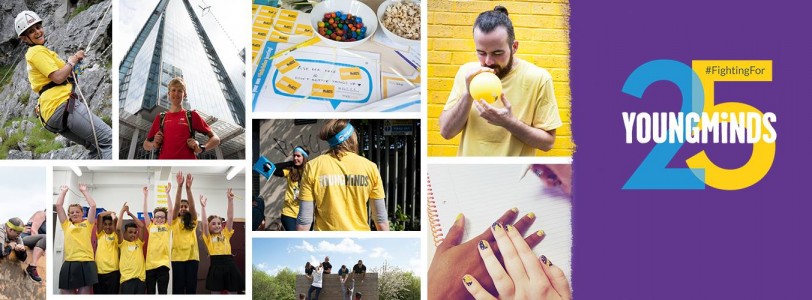Could you first introduce yourself to the readers?
I’ve spent well over a decade working with children, young people and their families across Education, Health and a range of other settings. It all started by accident really: I sort of fell into a job working for the Prince’s Trust, supporting vulnerable young adults. Seeing things from their point of view woke me up to how much better we could be at providing support, and the difference it can make when we get it right. I’ve had to adapt along the way: I’ve delivered training and consultancy to professionals, developed project management skills, but I’ve also spent a lot time in muddy fields running outdoor residentials. Working with young people is great because, whether you do a great job or you could have done better, they’re usually the first to let you know either way.
What is it that Young Minds do?
Now in our 25th year, we are the leading charity fighting for young people’s mental health.
Through our Activist Programme we closely support young people who have experience of mental health issues, providing support and training to help them speak openly about mental health, campaign for change and shape the services that affect their lives.
Every year, our Parents Helpline takes 13,000 calls from parents, many of who are struggling to get help for their children and don’t know where to turn.
We train 10,000 professionals who work with children each year, helping them to promote good mental health, build young people’s resilience and support young people struggling with specific issues like eating disorders or self-harm.
And we campaign for change – we’re calling for improvements to Child and Adolescent Mental Health Services (CAMHS), a rebalancing of the education system so that mental health is a priority, and greater rights for young people in inpatient care. We’ve just published a report to mark our 25th anniversary, which shows that it’s still far too difficult for young people to get the right support for their mental health.
Why did you want to work with Young Minds?
Over the years I’ve met so many young people who are increasingly well informed about mental health, and motivated to speak up about it. At the same time, I’ve see the immense pressure that young people are often placed under – more help is needed urgently. We all share a responsibility to ensure that when young people or their families ask for help they are met by the kind of systems and services that they deserve. I wanted to be part of that change.
What is the best part of your job?
I work with some very inspiring, talented people from across the children and young people’s mental health system – not just those delivering services, but the people who use them and their families. My role is about bringing those people together to share their perspectives and improve services; they’re experts by experience. I love seeing the impact that good ideas can make on a service, especially when they come from young people.
And what is the most challenging?
Stepping back and looking at the big picture. When you’re busy working on lots of different things it becomes very important to not get lost in the day-to-day detail. Fortunately, we work so closely with young people, parents and carers. It’s their real-life experiences that inspire the work we do – to them it means more than just the next deadline.
How do you define mental health?
We all have mental health, just like we all have physical health. Sometimes we feel well, sometimes not so well and sometimes we struggle to cope.
Having good mental health is about feeling positive about ourselves and others, being able to form good relationships, and having the resilience to overcome challenges. But we also all go through periods where we feel stressed or anxious.
Our message to young people is that if you’re finding life difficult, you’re not alone. Talk to someone you can trust – it could be a friend, a family member, a teacher, a doctor, a counsellor or a confidential helpline – or go to the YoungMinds website for more information about how to find support.
What campaigns are you currently working on?
One of our major campaigns at the moment is our Always campaign, which aims to ensure that the rights of young people in mental health units are always upheld. At the moment, we’re supporting a law that’s going through parliament calling for better accountability about the use of force in these units.
We’re also launching a campaign calling #FightingFor to mark our 25th anniversary. We want to make the point that, while there’s far greater awareness about mental health than there used to be, it’s still far too hard to find help.
How would you describe the current provision of mental health services for young people?
Jeremy Hunt, the Health Secretary, has described children’s mental health services as probably the weakest part of NHS provision. We know that far too many young people don’t get the help they need – whether that’s because they can’t get a referral to mental health services from their school or their GP, they have to wait a long time for an assessment, or because the right services simply aren’t available in their area. At the moment, children’s mental health services are reaching only about a quarter of children with mental health problems.
Do you think that the situation has improved or gotten worse in the last five years?
In 2015, the government invested an extra £1.4 billion over five years in CAMHS, which we welcomed. But even with this extra investment, services will only reach one in three young people with mental health problems by 2020. We also know that the extra money comes after years of underinvestment, so there is still a huge amount of work to do.
What should the government be doing to improve mental health care?
In its recent Green Paper, the government announced plans to introduce waiting times for mental health services and mental health support teams that would work in schools. We welcomed these proposals but are concerned that they will only be introduced gradually – they will be in a quarter of areas over the next five years. We want to see a faster pace of change, and there are also many other things the government could do to improve things. You can see what we’re calling for here.
What have been some of the biggest successes Young Minds has had?
Our Parents Helpline takes calls from about 13,000 parents every year, providing advice and support to any adult who’s concerned about the mental health or behaviour of a young person. We know that this makes a huge difference to a lot of people.
Our Always campaign is helping to change the law to make the use of force in mental health units far more regulated and ensure the hospitals are accountable when they do use force, while our Wise Up campaign successfully put pressure on the government to change the way that the education system promotes wellbeing and mental health.
Across the organisation, one of our biggest strengths is in young people’s participation, ensuring that people who have experienced mental health care are at the centre of decisions about treatment. We’re proud to be involved in a major project with the NHS to ensure that they learn from the experiences of young people as they plan services.
Where can people go if they need more help?
Whether you want to know more about how you're feeling, get information about a mental health condition or know what support is available to you, the guides on our website can help: https://youngminds.org.uk/find-help/









0 Comments